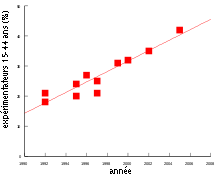Cannabis in France
.jpg)
Cannabis in France is illegal for personal use, but remains one of the most popular illegal drugs. Limited types of cannabis-derived products are permitted for medical uses.
History
French Egypt
During Napoléon Bonaparte's invasion of Egypt in 1798, alcohol was not available per Egypt being an Islamic country.[1] In lieu of alcohol, Bonaparte's troops resorted to trying hashish, which they found to their liking.[1] As a result of the conspicuous consumption of hashish by the troops, the smoking of hashish and consumption of drinks containing it was banned in October 1800, although the troops mostly ignored the order.[1] Subsequently, beverages containing hashish were banned in Egyptian cafes; cafes that sold them were shut down and "boarded up", and their proprietors were jailed.[1] During this time, hashish imported from other countries was destroyed by burning.[1] Upon the end of the occupation in 1801, French troops brought supplies of hashish with them back to France.[1]
Metropolitan France
In the mid-1800s, following travel and studies in Asia, French psychiatrist Jacques-Joseph Moreau studied hashish extensively and produced the 1845 work Du Hachisch et de l'aliénation mentale (Hashish and Mental Illness).[2]
In the 1800s, hashish was embraced in some European literary circles. Most famously, the Club des Hashischins was a Parisian club dedicated to the consumption of hashish and other drugs; its members included literary luminaries such as Théophile Gautier, Dr. Moreau 'de Tours, Victor Hugo, Alexandre Dumas, Charles Baudelaire and Honoré de Balzac.[3] Baudelaire later wrote the 1860 book Les paradis artificiels, about the state of being under the influence of opium and hashish.
Legality
In France, possession and use of cannabis fall under criminal law and the Loi du 31 décembre 1970, regarding health measures against drug abuse and suppression of trafficking.
Medical cannabis
France is a signatory to the 1925 Geneva Convention on drugs, and accordingly banned cannabis as a medical treatment in 1953. Since then, the importation, sale, transport and production of cannabis and cannabinoids has been illegal in France. However, in 1999, the Agence Française de Sécurité Sanitaire des Produits de Santé (AFSSPS) authorized the issuance of ATUs (temporary use authorizations) for health products otherwise not permitted on the French market. However, in 1991 a court rejected the demands of the NGO Mouvement pour la Légalisation Contrôlée concerning the importation of cannabis to supply 10 patients suffering terminal illness, arguing that such was incompatible with France's adherence to the 1961 UN Single Convention on Narcotic Drugs, and MLC's inability to scientifically control and administer medical cannabis.
As of 8 June 2013, cannabis derivatives can be used in France for the manufacture of medicinal products. The products can only be obtained with a prescription and will only be prescribed when all other medications have failed to effectively relieve suffering. The amended legislation decriminalizes "the production, transport, export, possession, offering, acquisition or use of speciality pharmaceutials that contains one of these (cannabis-derivative) substances", while all cannabis products must be approved by the National Medical Safety Agency (Agence nationale de sécurité du médicament – ANSM). A Pharmacists' Union spokesperson explained to the media that the change will make it more straightforward to conduct research into cannabinoids.[4]
Consumption

In 2012, 13.4 million French people between age 15 and 64 had tried cannabis, and 1.2 million people in Metropolitan France considered themselves regular users.[5] France ranks fourth in the European Union in terms of monthly consumption (following the Czech Republic, Spain, and Italy) and second only to Denmark in terms of persons who have ever used cannabis.[6]
Opinion
Per a poll conducted by CSA in November 2013, 55% of French people are opposed to the decriminalization of cannabis, while 44% said that the prohibition on cannabis is an abridgment of individual liberty.[7]
Per an Ipsos poll in 2016, 50% of French people favored the legalization of cannabis consumption (with conditions), and 49% were opposed.
References
- 1 2 3 4 5 6 Booth, M. (2015). Cannabis: A History. St. Martin's Press. pp. 76–77. ISBN 978-1-250-08219-0.
- ↑ Mitch Earleywine (15 August 2002). Understanding Marijuana: A New Look at the Scientific Evidence. Oxford University Press. pp. 14–. ISBN 978-0-19-988143-7.
- ↑ Levinthal, C. F. (2012). Drugs, behavior, and modern society. (6th ed.). Boston: Pearson College Div.
- ↑ Ann Törnkvist (10 June 2013). "French law on pot-based medicine takes effect". The Local. Retrieved 12 June 2013.
- ↑ Observatoire français des drogues et toxicomanies, cité par Frédéric Joignot, France, terre de joints, cahier Culture et Idées, Le Monde, 27 juin 2014.
- ↑ OEDT (2007), p. 41
- ↑ Sondage CSA, cité par Frédéric Joignot, France, terre de joints, cahier Culture et Idées, Le Monde, 27 juin 2014.
